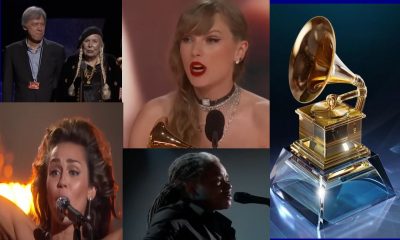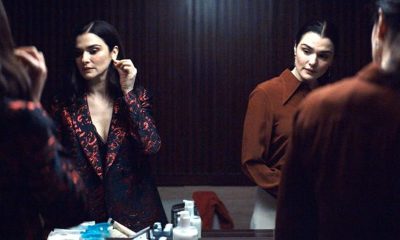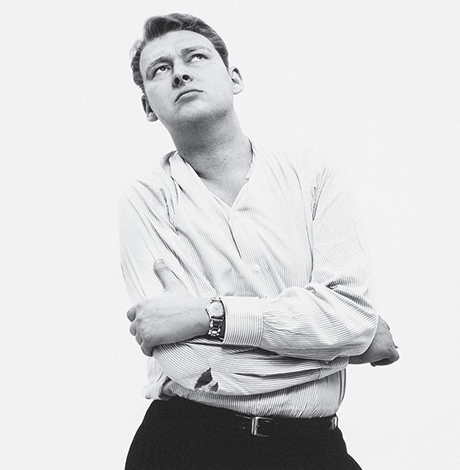Arts & Entertainment
Accompanying ‘Florence’
‘Big Bang’ star plays gay in new Meryl Streep vehicle
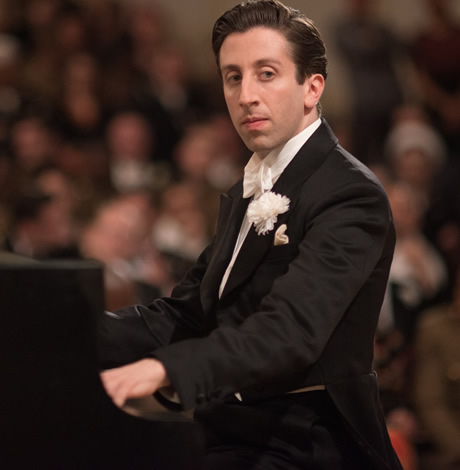
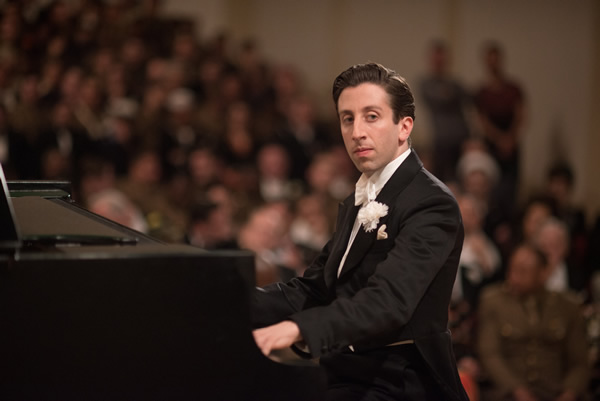
Simon Helberg as accompanist Cosmé McMoon in ‘Florence Foster Jenkins.’ (Photo courtesy Paramount Pictures)
Fans who only know Simon Helberg as the super nerd Howard Wolowitz on “The Big Bang Theory” will be surprised and delighted to see him in his latest role: Meryl Streep’s shyly flamboyant accompanist in the new movie “Florence Foster Jenkins,” opening Friday, Aug. 12 in wide release.
Madame Florence, played by Streep, was a wealthy New York socialite and patron of the arts. Although she was a classically trained pianist who played at the White House when she was a child, her claim to musical fame was an infamous 1944 Carnegie Hall performance that showcased her complete lack of singing ability.
Helberg plays Cosmé McMoon, Madame Florence’s long-suffering but supportive pianist. He started developing his character by zeroing in on the work of screenwriter Nicholas Martin.
“First and foremost is the script,” Helberg says. “He wrote these characters who are very vivid and very full. There were so many clues in the script. I took every word and direction as gospel.”
From there, Helberg turned to the historical record, discovering he was born in Mexico to Irish immigrants who later moved to San Antonio and New York.
“I went to research who he really was. There wasn’t a lot of information on him, but there were these little insights,” he says. “I thought he must have felt somewhat alien.”
As for McMoon being gay, everything pointed to it. McMoon was, after all, an accompanist. He was fascinated with muscle magazines and body-building competitions. He worked at a bathhouse and never married.
But Helberg decided to approach the character’s sexual orientation in a subtle manner, reflecting both the character and the period. McMoon starts out the movie “completely innocent.” But, as he starts to move about in the glittering social circles that Jenkins and her husband St. Clair Bayfield (Hugh Grant) inhabit, he becomes more aware of his sexuality. By the end of the movie, McMoon rushes backstage for the Carnegie Hall concert, explaining his lateness by breathlessly gushing, “I was attacked by lots of sailors.” As Helberg dryly notes, it’s not exactly clear what has happened, but “the light bulb has started to flicker.”
As for McMoon’s delightful physical mannerisms, they’re rooted in Helbing’s own training as a piano player: arms weighted to the floor and fingers dancing over the keys. Cosmé, Simon says, “has the posture that a classically trained pianist would be taught.”
Helberg, in fact, nearly became a professional pianist.
“I’m good,” he says. “I used to obsessively play and practice all the time in high school. But once I started acting, then I just started playing for fun. I threw away that career path. Because being an actor is so much easier than being a jazz pianist.”
“I kept playing for fun,” he says, “but never anything classical or opera. Then this came along. I really wanted to be in this movie and thought how great that I can play the piano. At least I’ll be able to put my hands in the right place and make it look real when a classically trained pianist plays the music. Maybe I’ll get to play a song or two.”
But things turned out slightly differently. Director Stephen Frears wanted a pianist who could really play Strauss and Mozart. Once he got the part, Helbing started a crash course in classical music. Then, once he got on set, Helberg started a crash course with Meryl Streep. Luckily, Helberg says, “I’m really good at making people sound worse.”
Streep and Helberg hey had a week and a half to rehearse before filming started.
“We had this great collaboration,” Helberg says. “We really had to go into this intimate and intense training. We had to work it and work it and work it. It was incredibly tough and satisfying to actually sit there and do it.”
Initially, Streep and Helberg assumed they would perform to pre-recorded tracks.
“I know Meryl always wanted to sing it live, but at first that didn’t seem possible,” the actor says. “We prerecorded at Abbey Road Studios, but once we did that, the producers said, ‘Well, they can really do it. Let’s just have them do it live. Screw that album.’”
Working with Streep, Helberg says, “was honestly a dream for me. She’s very aware of people and she’s very open and she’s grounded. She’s about making the best movie she can and it’s not about her. There’s something very effortless about it.”
Since McMoon becomes a confidante to both Madame Florence and her husband, Helberg also spent a lot of time working with Hugh Grant, whom he calls “hilariously self-deprecating and neurotic.”
“I thought that was my job but were battling for who was most neurotic. He was completely consumed with making the film the best it could be. I know he was also nervous about working with Meryl and even Meryl was nervous about being Meryl. That’s a lot of pressure.”
The scene, however, that was must challenging for the actor was McMoon’s delayed burst of laughter after he finally hears Madame Florence sing.
“It’s so hard to laugh that way when you’re having an uncontrollable fit of laughter.”
He asked Meryl Streep for advice, and she said, “Well try to cry, that always makes me laugh.” Helberg rejected that advice, fearing he’d actually cry.
He tried recording a couple of things on his phone, but finally realized, “I just had to surrender to it. Stephen had a conversation with me about how I saw that scene, about how I saw it being shot and how I saw it being cut together, and how I saw the elevator and how many people should be in it. He really was asking me questions that I felt less qualified to answer than he, but he really wanted to know what I thought. It was a tricky scene for everyone involved, but it did turn out nicely.”
Now that “Florence Foster Jenkins” is in theaters, Helberg is getting ready to start filming season 10 of “The Big Bang Theory.” The actor admits he doesn’t know a lot about what’s in store for Howard and his friend.
He says we’ll be seeing more of Christine Baranski, Laurie Metcalf and Judd Hirsch and meet Penny’s brother and mother.
“I literally have no idea.” he says. “They don’t tell us anything ever until we get the script the night before the table read. What I do know, based on my rudimentary knowledge of biology, is that he will be having a baby, because Bernadette is pregnant and I hear that’s how it works. Their baby will come in the first half of the season and they will be navigating that and figuring out who the bigger baby is, him or the baby.”
Sports
Bisexual former umpire sues Major League Baseball for sexual harassment
Brandon Cooper claims female colleague sexually harassed him

A fired former umpire is suing Major League Baseball, claiming he was sexually harassed by a female umpire and discriminated against because of his gender and his sexual orientation.
Brandon Cooper worked in the minor league Arizona Complex League last year, and according to the lawsuit he filed Wednesday in federal court in Manhattan, he identifies as bisexual.
“I wanted my umpiring and ability to speak for itself and not to be labeled as ‘Brandon Cooper the bisexual umpire,’” he told Outsports. “I didn’t want to be labeled as something. It has been a passion of mine to simply make it to the Major Leagues.”
But that didn’t happen. Instead of being promoted, he was fired. His suit names MLB and an affiliated entity, PDL Blue, Inc., and alleges he had endured a hostile work environment and wrongful termination and/or retaliation because of gender and sexual orientation under New York State and New York City law.
“Historically the MLB has had a homogenous roster of umpires working in both the minor and major leagues,” Cooper claims in his suit. “Specifically, to date there has never been a woman who has worked in a (regular) season game played in the majors, and most umpires are still Caucasian men. To try to fix its gender and racial diversity issue, defendants have implemented an illegal diversity quota requiring that women be promoted regardless of merit.”
Cooper claims former umpire Ed Rapuano, now an umpire evaluator, and Darren Spagnardi, an umpire development supervisor, told him in January 2023 that MLB had a hiring quota, requiring that at least two women be among 10 new hires.
According to the suit, Cooper was assigned to spring training last year and was notified by the senior manager of umpire administration, Dusty Dellinger, that even though he received a high rating in June from former big league umpire Jim Reynolds, now an umpire supervisor, that women and minority candidates had to be hired first.
Cooper claims that upon learning Cooper was bisexual, fellow umpire Gina Quartararo insulted him and fellow umpire Kevin Bruno by using homophobic slurs and crude remarks. At that time, Quartararo and Cooper worked on the same umpiring crew and being evaluated for possible promotion to the big leagues.
This season, Quartararo is working as an umpire in the Florida State League, one of nine women who are working as minor league umpires.
Cooper said he notified Dellinger, but instead of taking action against Quartararo, he said MLB ordered Cooper to undergo sensitivity training. According to his lawsuit, he was also accused of violating the minor league anti-discrimination and harassment policy.
Cooper’s suit says he met with MLB Senior Vice President of Diversity, Equity and Inclusion Billy Bean — who the Los Angeles Blade reported in December is battling cancer.
The lawsuit says at that meeting, Bean told the umpire that Quartararo claimed she was the victim, as the only female umpire in the ACL. Cooper said he told Bean Quartararo regularly used homophobic slurs and at one point physically shoved him. He also claims that he has video evidence, texts and emails to prove his claim.
But he said his complaints to Major League Baseball officials were ignored. His lawsuit said MLB passed him over for the playoffs and fired him in October. He said of the 26 umpires hired with Cooper, he was the only one let go.
Through a spokesperson, MLB declined to comment on pending litigation. Quartararo has also not publicly commented on the lawsuit.
a&e features
Eastern Shore chef named James Beard Finalist
Harley Peet creates inventive food in an inclusive space

In a small Eastern Shore town filled with boutiques, galleries, and the occasional cry of waterfowl from the Chesapeake, Chef Harley Peet is most at home. In his Viennese-inflected, Maryland-sourced fine-dining destination Bas Rouge, Peet draws from his Northern Michigan upbringing, Culinary Institute of America education, and identity as a gay man, for inspiration.
And recently, Peet was named a James Beard Finalist for Best Chef: Mid-Atlantic – the first “Best Chef: Mid-Atlantic” finalist representing the Eastern Shore.
Peet, after graduation from the Culinary Institute of America, took a position as sous chef at Tilghman Island Inn, not far from Bas Rouge. Falling in love with the Eastern Shore, he continued his passion for racing sailboats, boating, gardening, and fishing, and living his somewhat pastoral life as he opened Bas Rouge in 2016 as head chef, a restaurant part of the Bluepoint Hospitality group, which runs more than a dozen concepts in and around Easton, Md.
Coming from a rural area and being gay, Peet knew he had his work cut out for him. He was always aware that the service and hospitality industry “can be down and dirty and rough.”
Now as a leader in the kitchen, he aims to “set a good example, and treat people how I want to be treated. I also want to make sure if you’re at our establishment, I’m the first to stand up and say something.”
The Bas Rouge cuisine, he says, is Contemporary European. “I’m inspired by old-world techniques of countries like Austria, Germany, and France, but I love putting a new spin on classic dishes and finding innovative ways to incorporate the bounty of local Chesapeake ingredients.”
His proudest dish: the humble-yet-elevated Wiener Schnitzel. “It is authentic to what one would expect to find in Vienna, down to the Lingonberries.” From his in-house bakery, Peet dries and grinds the housemade Kaiser-Semmel bread to use as the breadcrumbs.
Peet works to support the LGBTQ community inside and outside of the kitchen. “I love that our Bluepoint Hospitality team has created welcoming spaces where our patrons feel comfortable dining at each of our establishments. Our staff have a genuine respect for one another and work together free of judgment.”
Representing Bluepoint, Peet has participated in events like Chefs for Equality with the Human Rights Campaign, advocating for LGBTQ rights.
At Bas Rouge, Peet brings together his passion for inclusion steeped in a sustainability ethic. He sees environmental stewardship as a way of life. Peet and his husband have lived and worked on their own organic farm for several years. Through research in Europe, he learned about international marine sourcing. Witnessing the impacts of overfishing, Peet considers his own role in promoting eco-friendly practices at Bas Rouge. To that end, he ensures responsible sourcing commitments through his purveyors, relationships that have helped create significant change in how people dine in Easton.
“I have built great relationships in the community and there’s nothing better than one of our long-standing purveyors stopping in with a cooler of fresh fish from the Chesapeake Bay. This goes especially for catching and plating the invasive blue catfish species, which helps control the species’ threat to the local ecosystem.
Through his kitchen exploits, Peet expressed a unique connection to another gay icon in a rural fine-dining restaurant: Patrick O’Connell, of three Michelin starred Inn at Little Washington. In fact, Peet’s husband helped design some of O’Connell’s kitchen spaces. They’ve both been able to navigate treacherous restaurant-industry waters, and have come out triumphant and celebrated. Of O’Connell, Peet says that he “sees [his restaurants] as canvas, all artistry, he sees this as every night is a show.” But at the same time, his “judgment-free space makes him a role model.”
Being in Easton itself is not without challenges. Sourcing is a challenge, having to either fly or ship in ingredients, whereas urban restaurants have the benefit of trucking, he says. The small town “is romantic and charming,” but logistics are difficult – one of the reasons that Peet ensures his team is diverse, building in different viewpoints, and also “making things a hell of a lot more fun.”
Reflecting on challenges and finding (and creating) space on the Eastern Shore, Peet confirmed how important it was to surround himself with people who set a good example, and “if you don’t like the way something is going … move on.”

Team DC, the umbrella organization for LGBTQ-friendly sports teams and leagues in the D.C. area, held its annual Night of Champions Awards Gala on Saturday, April 20 at the Hilton National Mall. The organization gave out scholarships to area LGBTQ student athletes as well as awards to the Different Drummers, Kelly Laczko of Duplex Diner, Stacy Smith of the Edmund Burke School, Bryan Frank of Triout, JC Adams of DCG Basketball and the DC Gay Flag Football League.
(Washington Blade photos by Michael Key)



















-

 State Department3 days ago
State Department3 days agoState Department releases annual human rights report
-

 Maryland5 days ago
Maryland5 days agoJoe Vogel campaign holds ‘Big Gay Canvass Kickoff’
-

 Politics4 days ago
Politics4 days agoSmithsonian staff concerned about future of LGBTQ programming amid GOP scrutiny
-

 District of Columbia23 hours ago
District of Columbia23 hours agoCatching up with the asexuals and aromantics of D.C.

